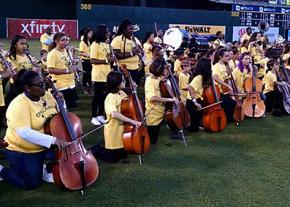Oakland honor band’s loud and proud message
Members of an honor band from schools in the Oakland Unified School District knelt as they performed the national anthem at an Oakland Athletics game in late September, joining the growing numbers of people following the example of San Francisco 49ers quarterback Colin Kaepernick and his protest against police violence. Australian socialist talked to members of the honor band and related their opinions and beliefs in an article for the newspaper Red Flag.
A GROUP of middle and high school students in Oakland, California, recently made international news when they joined San Francisco 49ers quarterback Colin Kaepernick's silent protest against racism and police violence in the United States. The students, members of the Oakland Unified School District's Honor Band, knelt as they played the national anthem before a professional baseball game.
The seventh- and eighth-grade students spoke to Red Flag about their decision to "take a knee." Inspired by Kaepernick, high school members of the district's school band first proposed the idea. Right away, the middle-schoolers knew that it would be controversial. From their first day of school, U.S. children are taught to show extreme reverence for the national flag during the anthem. This includes standing with hats off and hands on their hearts. Anything else is seen as highly disrespectful.
Despite this, some of the students felt so passionately about the need to take a stand against recent police killings that they still wanted to do it.

One student, 14-year-old Mikayla, delivered an impassioned speech to the others about the need to stand up against racism. "I wanted us to kneel because as a country we need to have a conversation about what is going on here," she said, explaining why she felt so strongly. "We have been turning our backs on murder and racism, and I was tired of not doing anything about it."
Before the game, band conductor Zack Pitt-Smith made it clear that the decision to kneel would be each student's choice. Even as they took the field, no one was sure who was going to do it.
Serena, another 14 year old, remembers:
I was scared to kneel because I wasn't sure if anyone else would join me. I was thinking, "Should I kneel? I feel very strongly about this--I'm going to do it." But I was still shaking because I didn't know what everyone else would do.
Nearly all of the 155 band members knelt as they played. Everyone had their own reasons. "I'm learning about human rights in history class, and the number one human right--the right to live--is being violated right here," Serena said.
"I wanted to show my dislike for our country's recent actions," 12-year-old Eden added. "I was trying to say, 'I don't like our country the way it is right now!'"
The multiracial nature of their protest was very important to them. Griffin, a 13 year old, explained: "[It] shows that both people who are being discriminated against and people who are not are standing up together against mistreatment."
AT THE game itself, their action was met with applause. But soon after, they faced an onslaught of criticism in the news and on social media. Although they knew their act would be controversial, most band members were surprised at the number of negative comments accompanying online news stories. Still, most weren't fazed by the criticism. "Even though we have haters, we know we are fighting for what is right, so I ignore them," Griffin said.
Many commentators accused Pitt-Smith and other adults of manipulating them, claiming that the students didn't fully understand what they were doing. "A lot of people think that because we are kids, we aren't paying attention to what's happening in the news." Mikayla said, "But we notice a lot, and see who got shot."
As a group they discussed how best to defend their actions. "We had lots of debates every week," said 12-year-old Johnny. One student who isn't African American was told that she shouldn't have done it because racism and racist police violence don't affect her. At the time she didn't know what to say, so she brought her question to the group. Someone remembered the words of Martin Niemoller's well-known poem about solidarity, "First they came for the communists."
Some of the students voiced frustration that the people who were criticizing them were avoiding talking about the issue of racism and police violence. "We did this to make a point that bad things are happening," said Johnny. "People are ignoring what we are trying to say, and only saying it was disrespectful, without having the discussion."
So what next? Elijah, a 12 year old, responded quickly to say, "My plan is to keep protesting until there is racial equality, and there are consequences for police officers who hurt people". Olivia, also 12 years old, said, "I hope these protests show the world how much racism there is here. I will definitely continue my protests. I want to show that even though we are young we can still take a stand and change the world."
First published at Red Flag.


